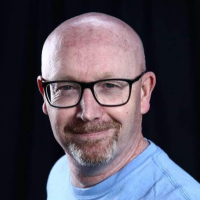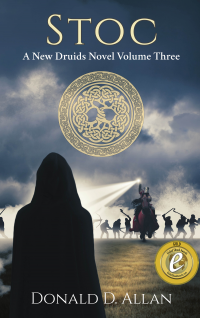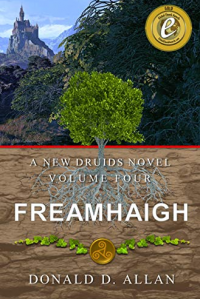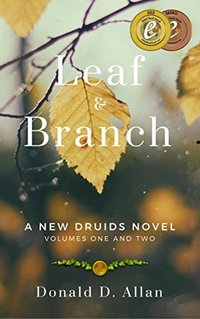Donald D. Allan Interview Published on: 04, Apr 2018
 Are the winters truly as cold as they say in Canada? Have you spent your entire life there?
Are the winters truly as cold as they say in Canada? Have you spent your entire life there?
Cold is relative. I was born in Ottawa, the nation’s capital. Winters here can be quite cold. Dipping down to -30C at times. Canadian weather various from coast-to-coast. It is quite mild in Victoria, and wet and cold in Halifax. So yes, it is frakkin cold in Canada! I lived in Falls Church, Virginia, for four years. Coming home to Canada was hard that first winter! But it is relative. You become accustomed to it in time. Now -20C is nothing - provided I am dressed appropriately. Did I say I hate winter? I do. Hate it.
How long were you in the Royal Canadian Navy? Do you think your experiences there coloured your writing in any way?I joined the Naval Reserves back in 1982 at the age of 17. In 1991, I transferred to the Royal Canadian Navy as a regular force Naval Warfare Officer. Back when I was 17, I was encouraged to become a writer by a wonderful teacher, an accomplished writer himself. I ignored his recommendation and instead pursued my Navy dreams and left all that behind, without much regret. A few years before I retired from the military I returned to writing. The dream had never left me. I truly enjoy it. All my years in the Navy I was the fellow people approached to get their writing fixed or tweaked to read better. Unfortunately, military writing is its own form and does not translate well to fiction. It’s been a struggle to “lose” that military writing influence and go back to my roots. Being military has led to a fairly disciplined lifestyle. That lends itself well to keeping my writing on a schedule. So there is that!
At what point in your life did you decide that you wanted to write for a living? What attracted you about the fantasy genre?I’ve always wanted to write for a living. I love the written word. I have lost myself in science fiction and fantasy my whole life. I am never without a new book, or books, ready to be devoured. For me, ever since my grade four teacher introduced me to the Lord of the Rings, fantasy has been my go-to genre. I can’t get enough of it. It was natural for me to write in the genre. It’s all I think about!
For a lot of authors, it takes time to write a bestselling or award-winning novel. However, you were able to achieve that with you debut novel, so, how does that make you feel? Do you think that humility is an important trait to keep as an author?I was stunned when I won a gold award for the first novel of my New Druids series. It came as a surprise and I’m afraid I made a bit of a fool of myself jumping around cheering whilst at a book sale event in Ottawa. The immediate effect of winning was that I felt confirmed as an author. I was real. The humility of being an artist is that your work is up for review. I’ve read harsh criticism of my writing and the positive. The one thing that holds me strong is that everyone seems to like my writing style. That keeps me going. The odd email from a fan thanking me for the world I built keeps me grounded and writing. I write for my readers. I truly do.
What do you find most captivating about Druids and the legends associated with them? It may be a "fantasy" subject now but do you think they could have ever existed?Druids really did exist! Its historical and nothing fantastical at all. I’ve read much of druids over the years, either in non-fiction or in fictional tales. I’ve always been fascinated by them. The allure for me was that they were essentially the more learned of the masses. They gave guidance and reason to the world around the Celtic people. They were advanced in the ways in science. They tied science to nature and embraced both concepts. They made people notice the world around them.
What inspired the tale of "Duilleog"?I’ve always toyed with a novel concept involving a young man coming into power in a medieval-like setting. How would a man, almost still a boy, come to grips with that power? How would he use it? The Marvel Spider-Man concept rings true with me and I’ve always loved a story where with great power comes great responsibility.
Do you prefer creating characters first and then building a story around them or vice versa?The main storyline drives my characters. I’ve plotted out the entire series and know the role my characters must play. Oddly enough, my characters write themselves. I know who they are and what drives them but when writing scenes they determine the dialogue more often than naught. Sometimes it results in minor storyline changes.
Do your books carry any symbolism? What or who could the Church of the New Order and Will Arbor be compared to in real life?I want people to take from my stories what they will and I don't want to offend anyone. I can say that my series explores the church, science, and magic. People told me "you must hate the church" because of my first novel. I've received not exactly hateful email, but certainly emails from religious people who hate what I wrote. They should read the series first. My first novel establishes that the church of my world is suffering from very bad leadership. They are failing the people and their faith. It's funny how people come to conclusions. My church is not even one that resembles anything real in this world; except I borrow from the Anglican church rank structure. My world is about embracing the ideals of religion, science and magic equally. The only symbolism in my novels is the triskelion. It has religious roots and roots in the mystic. I use it to my storytelling advantage. The three arms are religion, science and magic.
Would you say that your writing has "evolved" or changed in any way since writing "Duilleog" to "Stoc" and now the fourth instalment of the A New Druids Series?Absolutely. Writing comes much easier to me now. Duilleog took me 18 months to write - mind you I had to stop to world build for a few months. I now write a novel in less than a year and it could a lot faster if I didn’t procrastinate so much! I wrote half of my fourth novel in one month (thanks to NaNoWriMo). I’m struggling to finish it – as always - because life keeps interfering. Plus I had to deal with my retirement from military life over to a civilian public servant life. But today I write much more relaxed. The words pour out of me and I seldom struggle to get my sentences or paragraphs just right. I have evolved into a more competent and confident writer. It makes the experience that much more rewarding. I can concentrate more on the story than I do worried about format or syntax. Knowing my world so intimately frees me to be more creative.
What do the names "Duilleog", "Craobh", and "Stoc" mean? What is the mythology or history associated with the names and language you use in your books?My parents and brother immigrated to Canada from Scotland back in the early 60s. I was raised in a Scottish home and thought of myself often as more Scottish than Canadian. Which is kind of funny. The movie “So I Married An Axe Murderer” was almost a documentary of my upbringing. I relate to the Celtic world although I know very little about it. I needed a rank structure for my druids and thought immediately to the structure of a tree. Duilleog means leaf, Craobh means branch, Stoc means stalk, and Freamhaigh means root. When I look at a tree I think we are seeing them upside down. It is the roots that is the tree. The branches and leaves are just the “lungs” of the tree. If a tree was to have a “brain” it would be in the roots. I know: it makes little sense, but it does to me! I have read so many Arthurian tales that the English medieval setting was a natural place for me to go. The ranks became my book titles. I should mention my realm of Belkin is like a small version of England and Scotland. At least it is how I think of it. My readers may have alternative ideas, and that’s good too.
Tell us a little about the sci-fi novel you're working on nowadays. What are some similarities and differences between writing fantasy and writing science fiction?Great question. I wrote the outline for my science-fiction novel long before I wrote Duilleog. It was a novel I kept picking up and writing a little bit here and there. But I kept falling into a “who cares” kind of mood. My love is fantasy and writing science-fiction simply does not appeal to me. The main theme of my sci-fi novel; however, made it into my world of Belkin and the New Druids series. After Freamhaigh (the fourth novel) I will write this sci-fi story. The act of writing the New Druids series has opened up possibilities for me with that sci-fi novel and I’m excited to get back to it. I think sci-fi and fantasy are two very different styles of writing. I’m not naive but I do believe that sci-fi writes from the wonder of new technology, and the prophetic look into the near or far future of humans. Fantasy is an exploration of the fantastical. Imagined worlds where magic is possible, where the description of a sky or a treeline is fascinating just by itself. For me, it’s not fantasy unless magic is present and it’s not sci-fi unless the future of mankind is at stake either because of something we’ve done or something being done to us. I love both genres. But fantasy is more interesting to me. Science-fiction is sometimes too non-fiction in some regards.
What does your wife think of your books? What role does she play in the writing, editing or marketing process of your books?My wife loves and supports my writing. But she does arts and crafts. I write. Opposites attract, they say. I should mention she has yet to finish my second book! Lol. She is not a reader and certainly not a fantasy reader. She does love fantasy movies though, so there’s that.
Having received so much recognition for your work so early on, what are some writing tips and tricks you would like to share with the rest of us?Write because you love to write. Write from your heart and try to capture that wonder you had when you read something remarkable from your favourite writer. And then put it out there and don’t worry about what people think. Except focus on the positive feedback and then write for those people. You open up worlds to them and you owe it to them to keep doing so. Even if it’s just one person. What I often tell people who ask me for advice on writing is to get to chapter three. As soon as you write three chapters your story will demand you finish it and you will be answering to that higher authority. Then write the whole damn thing according to your outline. THEN go back and tweak it. You will be tempted to write chapter one over. Or tweak it. Or fix it. Or whatever. Resist that impulse and write the next chapter and then the next one. Next thing you know you will have written a novel. Congratulate yourself. Publish. Write another one. Write it for that young girl, wearing a hoody on a bus, cold, hungry and tired, but lost in the world you created. You owe her that little escape from the harshness of life. Because you can create it. With great power comes great responsibility.
Share Donald D. Allan's interview
Born in Ottawa, Canada, author Donald D. Allen always wanted to write for a living, fantasy always being his go-to genre. He joined the Naval Reserves in 1982 at 17, ignoring the advice of his teacher to become a writer. It was only after he retired from the military that he returned to writing. In his books, the main storyline drives his characters, but his characters always write themselves. Donald's series explores the church, science, and magic. The names of his books, Duilleog means leaf, Craobh means branch, Stoc means stalk, and Freamhaigh means root. To him, it’s not fantasy unless magic is present and it’s not sci-fi unless the future of mankind is at stake, but he loves both genres. To the rest, he advises writing from your heart because you love to write and don’t worry about what people think.








